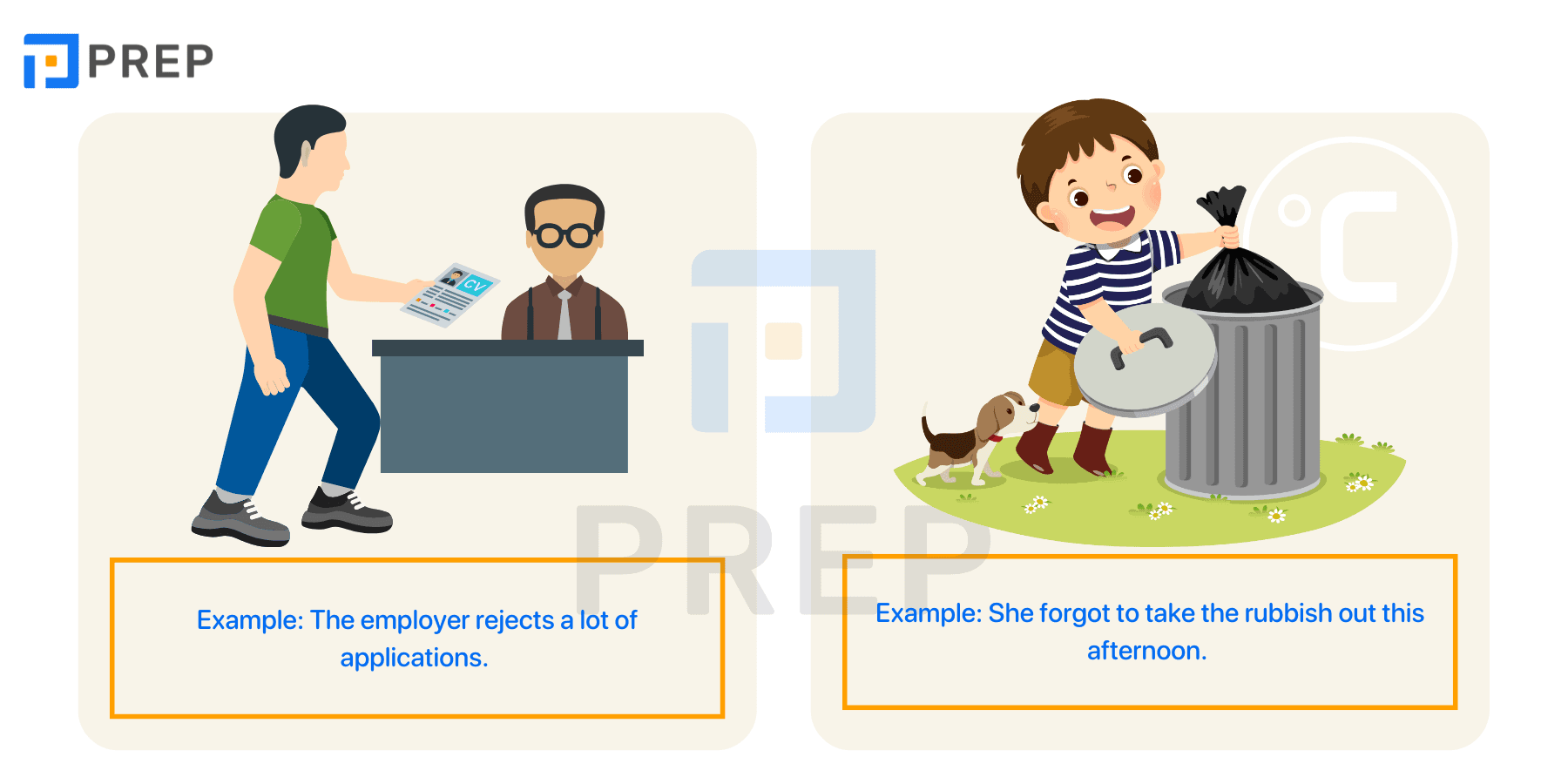What is Refuse in English? Basic knowledge about Refuse in English
What is Refuse in English? Is it followed by "to V" or "Ving"? Let's explore the meaning, usage and the example of Refuse in English, as well as the difference between Refuse and Deny!

I. What is the meaning of Refuse? Functions of Refuse
Before diving into Refuse in English, let's understand its definition!
1. What is the meaning of Refuse?
Refuse (/rɪˈfjuːz/) acts as a noun and a verb:
-
As a noun, the Refuse meaning is: unwanted waste material, especially material that is regularly thrown away from a house, factory, etc. For example: I’ll bring the kitchen refuse to sort it out and dispose of it.
-
As a verb, the Refuse meaning is: to say that you will not do or accept something. For example: I felt that it would be rude to refuse their invitation to dinner.

2. Functions of Refuse in English
Refuse in English serves four main functions. Check the table below for details!
|
Functions of Refuse |
Structure |
Example |
|
Intransitive verb |
S + Refuse |
Jane asked John to eat mango but he refused. |
|
Transitive verb |
S + Refuse + O (Noun/ Pronoun) |
Clark will not refuse your invitation if you ask politely. |
|
Noun |
Used like other nouns (can be subject, object, etc.) |
|
II. How to Use Refuse in English
Now, let's explore how to use Refuse in English!
1. To say that you will not allow something; to say that you will not give or allow somebody something that they want or need
In this case, Refuse is followed by a noun or pronoun. The structure is:
S + refuse + somebody/ something.
For example:
-
In this room, he made her a proposal and she refused him.
-
Jane refused her friend’s hand-made gifts.
2. To say or show that you will not do something that somebody has asked you to do
The structure is:
S+ refuse + an invitation/offer
S+ refuse + a request
For example:
-
She refused his invitation to go out and watch a movie with him.
-
Mary refuses her boss’s request for a conference recommendation.
3. To say that you do not want something that has been offered to you
The structure is:
S + refuse + to-V
For example:
-
My friends refuse to help me with my homework.
-
My mother refused to let me go out with my buddies.
III. Synonyms and antonyms of Refuse in English
Here are some synonyms and antonyms to expand your knowledge about Refuse in English:
1. Refuse synonyms
|
Refuse synonyms |
Meaning |
Example |
|
Withhold /wɪðˈhoʊld/ (v) |
to refuse to give something or to keep back something |
During the trial, the prosecution was accused of withholding crucial evidence from the defense. |
|
Reject /rɪˈdʒekt/ (v) |
to refuse to accept, use, or believe something or someone |
The employer rejects a lot of applications. |
|
Spurn /spɝːn/ (v) |
to refuse to accept something or someone because you feel that thing or person is not worth having |
Jane spurned my offer to help. |
|
Garbage /ˈɡɑːr.bɪdʒ/ (n) |
waste material or unwanted things that you throw away |
She threw the cookies in the garbage. |
|
Rubbish /ˈrʌb.ɪʃ/ (n) |
waste material or things that are no longer wanted or needed |
She forgot to take the rubbish out this afternoon. |

2. Antonyms of Refuse in English
|
Antonyms of Refuse in English |
Meaning |
Example |
|
Accept /əkˈsept/ (v) |
to agree to take something |
I offered her an appointment, but she wouldn’t accept it. |
|
Admit /ədˈmɪt/ (v) |
to agree that something is true, especially unwillingly |
I admit that I already played this game. |
|
Agree /əˈɡriː/ (v) |
to have the same opinion |
I agree with you on this opinion. |
|
Consent /kənˈsent/ (n,v) |
to agree to do something, or to allow someone to do something |
He reluctantly consented to the proposal. |
|
Approve /əˈpruːv/ (v) |
to accept, allow, or officially agree to something |
He doesn’t approve of playing games. |
IV. Distinguishing between Refuse and Deny
Some people confuse Refuse and Deny. Let’s clarify the differences:
|
Distinguishing between Refuse and Deny |
Refuse |
Deny |
|
Similarities |
Position: Both are verbs followed by an object. |
|
|
Differences |
Structure/Position:
|
Structure/Position:
|
|
For example:
|
For example:
|
|

V. Exercises for using Refuse in English with detailed answers
To remember how to use Refuse in English, let's practice with some exercises!
1. Exercise
Exercise 1: Choose the correct answer in the questions below
-
Jim refused (to say/ saying) anything about the problem.
-
She has always had a loud mouth, she refuses (being/ to be) silenced.
-
Alex refused (to comment/ commenting) anything further.
-
Mary refused (to accept/ accept) the handmade gift.
-
He refuses (to give up/ giving up).
Exercise 2: Select the appropriate word
-
Mary (denied/refused) to accept this letter.
-
Anna (denied/refused) to say anything about the problem.
-
Jack (denies/refuses) stealing money from Mrs. Bella.
-
Maria simply (refuses/denies) to play the piano.
-
Ken (refused/denied) hitting Rio yesterday.
2. Answer
|
Exercise 1 |
Exercise 2 |
|
|
These are the insights from PREP on the usage of Refuse in English commonly encountered in communication, study, and work. Keep following PREP to update your English knowledge!

Hi I'm Chloe, and I am currently serving as an Product Content Administrator at Prep Education. With over five years of experience in independent online IELTS study and exam preparation, I am confident in my ability to support learners in achieving their highest possible scores.
Comment
Premium content
View allPersonalized roadmap
Most read












